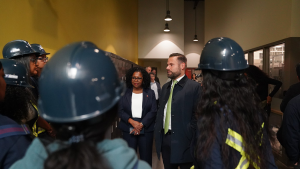It was a big year for construction in Ontario, but arguably the most prominent story for the industry was the passage of Bill 142, the Construction Lien Amendment Act, 2017, which achieved royal assent in the legislature earlier this month.
The bill modernizes the Construction Lien Act, introduces a prompt payment regime and a dispute resolution process.
Clive Thurston, president of the Ontario General Contractors Association, said it deserves to be the top story for the second year in a row because the industry worked together and succeeded.
“The difference this year is that it’s a reality and the 87 to 0 vote in the house I think speaks to how the industry continued to work together to make this a reality, sometimes separately, but always in the same direction,” he explained.
“Now the hard work starts. There is a very short time period to get the regulations done and they’ve got to be right or we risk endangering what we’ve achieved.”
Ian Cunningham, president of the Council of Ontario Construction Associations (COCA), said the association has been pursuing reform for more than 25 years.
“The army of COCA volunteers who met with their local MPPs at their constituency offices and who participated year-after-year in our unrelenting lobbying events at Queen’s Park, it paid off in spades,” said Cunningham.
For me the number one issue is safety and prevention of injuries and health exposures and deaths
— Patrick Dillon
Provincial Building and Construction Trades Council of Ontario
A prominent issue for the Progressive Contractors Association of Canada (PCA) was the continued growth of “construction labour monopolies,” specifically in the Region of Waterloo where a construction employer designation on ICI projects has found scope creep in the civil world, stated Karen Renkema, senior manager of public affairs for the PCA. She also pointed to the recent resolution by Sault Ste. Marie Council to seek non-construction employer status.
“Hopefully the tables have turned now and this is the way municipalities start looking at this issue in 2018 as its time for us to try and figure out how we can get out of these handcuffs and be able to do a lot more infrastructure,” she said.
PCA is also looking forward to furthering the discussion on a workplace that respects the dignity of the human being, said Renkema, adding there was much needed dialogue on the issue in 2017.
Diversity is also a priority for the Provincial Building and Construction Trades Council of Ontario, said its business manager Patrick Dillon.
“At our convention, we passed a number of resolutions dealing with safety and training and there is going to be a real focus going forward on the diversity side,” said Dillon.
Health and safety also remains a top priority for many of the associations.
“For me the number one issue is safety and prevention of injuries and health exposures and deaths in the workplace. That continues to be an ongoing struggle. I have to sadly say that we’re not winning the game at all,” said Dillon.
“Part of the problem in my opinion is to see how the lives of workers are devalued in comparison to the lives of ordinary citizens. Until government and business and the justice system recognizes that, I think we continue along this trail of pretension prevention.”
Andy Manahan, executive director for the Residential and Civil Construction Alliance of Ontario (RCCAO), said Premier Kathleen Wynne delivered some disappointing news in early 2017 when she announced the province would not allow the City of Toronto to move forward with putting tolls on the Gardiner Expressway and Don Valley Parkway, a revenue tool proposed by Mayor John Tory.
“Premier Wynne has talked a really good line about we need new revenue streams but I think she really has solidified a reputation to reject requests from the municipal sector to pay for infrastructure,” said Manahan. “Municipalities want greater autonomy to try and build up new sources of revenue to pay for infrastructure but they keep on getting batted down by the province.”
The RCCAO also filed a joint application for municipal class environmental assessment (EA) reform which was successful.
“We did get something in writing in the spring from the Ministry of the Environment and Climate Change saying we will have a review of the EA legislation and we will be done by December 2018, so to me that was a significant move,” Manahan explained.
“Some of the reform we’re talking about is how do we go through the process quicker. If we don’t go through that faster, some of that so-called stimulus money the government wants to provide is not going to be injected into the economy in time.”
The fact Canada Infrastructure Bank legislation was passed is another milestone in 2017 for the RCCAO.
“The thing that we like about it is there will be an ability to accept unsolicited bids from the private sector,” he said. “Right now the process is Queens Park, through its various treasury boards and cabinet committees, will come up with a list of projects that are then sent to Infrastructure Ontario but that kind of prevents innovative projects from coming forward.”
Richard Lyall, president of the Residential Construction Council of Ontario (RESCON) and chair of the Construction and Design Alliance of Ontario, said one of the big themes this year was efficiency in the approvals process.
“We have all our leaders talking about we need to be globally competitive. You’re not going to attract international investment here in real terms unless you’ve got an adequate supply of reasonably affordable housing and we don’t because of the massive amounts of red tape and inefficiency in the development approvals process,” Lyall commented.
He suggested the industry needs technological advancement to be competitive internationally.
“At RESCON, what we’re talking about is a very sophisticated BIM platform, cloud sourced, open software system where all of the players in the approvals process can be linked into a particular project…everything is handled electronically, everything is tracked,” Lyall explained.
David Caplan, COO of the Ontario Road Builders’ Association (ORBA), said the top three issues the association faced in 2017 were the auditor general’s report criticizing road construction and premature pavement cracking, the amalgamation of ORBA and the Ontario Hot Mix Producers Association, and the transition to an almost entirely new ORBA team.











Recent Comments
comments for this post are closed